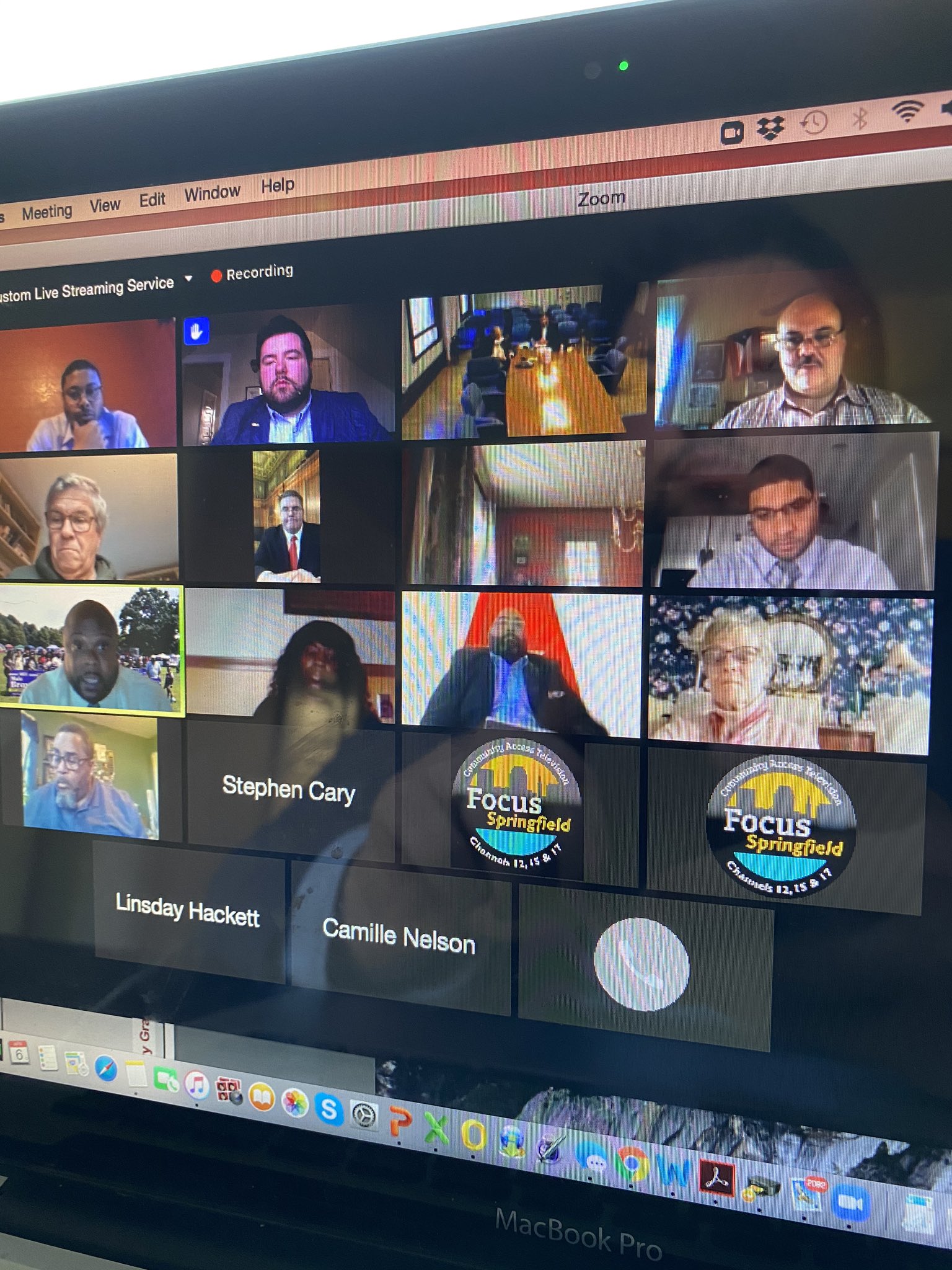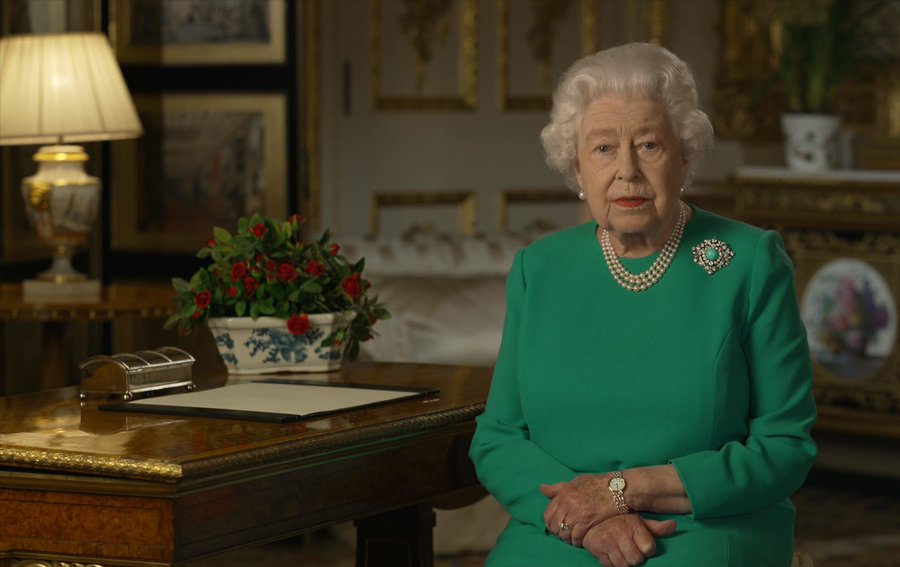Take My Council, Please: Zoom, Zoom, Zoom…into the Unknown…
SPRINGFIELD—As the economic devastation from the COVID-19 outbreak sets in, city councilors here met—remotely—for the first time since public health restrictions made its traditional gatherings impractical. Freed of some open meeting law requirements by Governor Charlie Baker’s executive orders, the body met via the web platform Zoom to dispense with financial items that has accrued, including some directly related to the pandemic.
Much of the meeting focused on accepting those grants, with administrative staffers filling in the details. Appearing remotely from a room ostensibly in City Hall were Chief Administrative & Financial Officer Timothy Plante, Health & Human Services Commissioner Helen Caulton-Harris and City Solicitor Ed Pikula. Plante warned that the city—and the state, which funds a massive chunk of Springfield’s budget—must tackle the fiscal stress of falling revenue and escalating coronavirus expenses.
All councilors appeared on the Zoom meeting aside from Ward 5 Councilor Marcus Williams. Over the weekend, Williams announced his cousin Kamari Williams, who is also the son of State Rep Bud Williams, had passed away.
Plante indicated that much of the city’s fiscal situation relative to the COVID-19 outbreak is unknown because a lot will depend on how the state handles its own collapse in revenue. However, in debuting a fairly normal February revenue and expenditures report, Plante also discussed the budgetary impact in March.
At-large councilor Jesse Lederman asked for specific figures. Plante said. the city has spent $600,000 in unanticipated expenditures to deal with the outbreak while losing about $1 million in revenue. However, both figures would explode in the coming months. The city’s COVID-19 expenses could reach $10 million.

Solicitor Pikula, CAFO Plante & HHS Commissioner Caulton-Harris just Zoomin’ (via Focus Springfield still)
Responding to councilors’ questions, Plante said Springfield’s revenue losses were spread across all departments, singling out permits and fees that did not materialize. The city has likely lost meals and hotel tax revenue, too, but the state collects that for the city. Thus far, the state has not publicly spoken of slashing local aide for the current fiscal year, but FY2021 could be rough.
While revenue remains problematic, Plante said Springfield had brought back the consultant who helped the city recoup reimbursements from the Federal Emergency Management Agency for the tornado.
“We are reasonably assured we’ll get the money from FEMA,” Plante said, of COVID-19 expenses.
Another strategy that Plante outlined was maximizing the incoming grant money. On Monday, the Council accepted no less than $3.5 million in grants from the feds as part of the CARES Act, one of the coronavirus relief bills Congress passed in March.
The use for much of this funding will depend on forthcoming guidance due from on high. Another factor is what FEMA will ultimately pay for. Plante said that if FEMA agrees to reimburse the city—the prime example was a tent erected along Worthington Street to provide COVID-19 relief, particularly for services to the homeless—then CARES Act funds could go toward other relief efforts.
Another wrinkle will be what becomes of the funding for school busing. Plante said the State Department of Elementary and Secondary Education has advised that the busing contractors be paid even though state law clearly says municipalities need not pay for services not rendered.

As HHS Commissioner, Helen Caulton-Harris has been a central figure in the city’s COVID-19 response. (WMP&I)
The Council also accepted a $200,000 grant from the commonwealth which lays the groundwork for the Governor Charlie Baker’s plan to implement test and tracing. The funding was not necessarily exclusive to testing and tracing, but the ability to rapidly and effectively identify positives and trace their contacts will become essential to reopening the economy.
“The primary purpose of this grant was really boards of health,” Commissioner Caulton-Harris said. Specifically, what do they need to perform contact tracing, that is calling all the contacts of known COVID-19 positive individuals. “That’s going to take a lot of time and a lot of staff,” she continued.
Caulton-Harris also noted that Springfield’s grant was typical of cities its size. Only Boston received a substantially higher sum.
While some of the funds the city is getting from the feds could ultimately be used to provide actual testing for the novel coronavirus that causes COVID-19, that is not happening yet.
“The challenge is we don’t have the tests currently,” Caulton-Harris said.
Councilors also accepted $6.4 million in regular grants from the US Department of Housing & Urban Development for homeless services. Of that $4.2 million is for housing and services. The other $2.2 million funds medical, dental and behavioral health services for the homeless. Another $53,000 was accepted to augment existing homeless programs to deal with COVID-19.
The Council also approved smaller grant to battle drug abuse and a donation of safety glasses to the Police Department.

With COVID dawns the age of the Brady Bunch Council, errr…the Zoom Council. (via Twitter/@JLLederman)
There was an extended debate about acceptance of this year’s Shannon Grant. The nearly $1.1 million grant funds at-risk youth programs. The Springfield Police Department is the recipient, but some 11 sub-grantees were on the application.
Councilors worried the grant process was limited and benefited the same sub-grantees year after year.
Ward 4 Councilor Malo Brown was adamant that the process was not open and at-large councilor Kateri Walsh also expressed concerns about whether it was being limited.
No representatives from Pearl Street were on the Zoom meeting and Plante said he would look into it.
Typically, Plante said, there is a process. However, if the sub-grantees are on the city’s grant application, they are probably entitled to remain as sub-grantees after Springfield formally receives the money. If they are not on the grant application, the city could have more discretion. Indeed, it would be required to allow all comers to apply.
“Legally, we cannot give money to nonprofit unless we have an open process,” Plante said.
In addition to Plante’s commitment to investigate, Council President Justin Hurst said he would ask Police Department representatives to attend future meetings on the subject.
Despite these concerns, there was little appetite to delay acceptance. Plante warned that as the state goes into fiscal shock, it will sweep unspent grant monies to cover deficits. At-large Councilor Tracye Whitfield concurred, urging the process be reviewed but the money accepted. It then was.

It’s gotten worse since this graphic was created even as some municipal business has gone on. (created via WMassP&I and Warner Bros. images)
The Council also accepted Springfield’s annual allocation of Chapter 90 road repair money. Ostensibly not upended by the outbreak—or at least not yet—the disbursement comes every year to assist cities and town repair their arterials and side streets.
Public Works czar Chris Cignoli was not on the Zoom meeting, which limited the usual wave of questions from councilors about how streets to paved this year were chosen. Ward 8 Councilor Orlando Ramos asked about whether road work would happen given the outbreak. Plante said that Palmer Paving had opened its plant.
Solicitor Pikula noted that the governor had specifically said that essential construction would include civil projects like roads and schools. By comparison, Pikula continued, Worcester’s new ballpark was not essential.
The Council also greenlit a series of budget transfers. Among them were $163,000 for landscaping by the Parks department. The money came out of savings from delays in hiring for the Forestry Division. Nearly $22,000 was transferred into the Forestry Division for vender services, however. Some $47,000 was transferred from contingencies to cover a recalculation of the city’s obligation to the School Department. Another $275,000 was moved within DPW from salaries to cover, among other things workers compensation claims.
The Council granted Columbia Gas an easement to connect to the Brightwood/Lincoln School project in the North End.
The final item allowed the city to renew its Smart911 software contract for five years. The city will save several thousand dollars a year. Under state law, contracts longer than three years need a waiver from the City Council. Ward 2 Councilor Michael Fenton, a frequent critic of granting the waiver too soon, questioned the decision but did not oppose the item. The authorization passed unanimously.
Hurst announced before adjournment he was planning a hearings meeting for later this month. Originally no April meetings were planned, but they became inevitable as councilors sought oversight of Springfield’s response and as federal funds flowed in.
Despite few hiccups, the online iteration of the Council was starkly different. Aside from views of councilors’ home offices—save at-large councilor Sean Curran who ostensibly dialed in from the Council chamber—it was odd to see the Council disaggregated like this.

Sovereign from another mother. (via Twitter/@RoyalFamily)
Queen Elizabeth, II, a descendant of Springfield’s former rulers, said Sunday “we will meet again.” The Council has already proven it can in the age of COVID-19. However, her majesty was referring to in-person contact. When the Council can do that again remains unknown.
